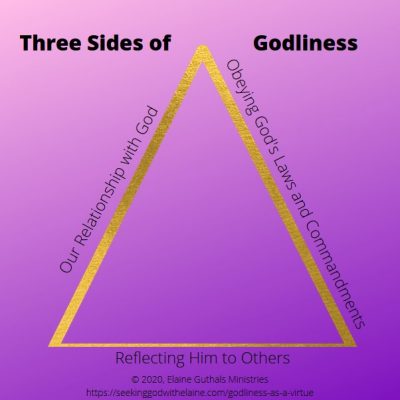Godliness means being like God, doesn’t it? It doesn’t!?!? This devotion determines what it really means and how we progress to achieve it.
Nuggets
- We love and show reverence to God by following His laws and commandments.
- Faith is the foundation, and the end result is godliness.
- We have to live like we were converted.
- Righteousness is the thought or behavior; godliness is the cause for the thought or behavior.
Devotions in the Christian Virtues series

With this devotion, we turn a corner. The previous devotions in this series —really — focus on us: faith, goodness, knowledge, temperance, and patience.
Now, we are going to focus on God. Specifically, we are going to talk about godliness. But what does that really mean? We have to know what we’re making the standard, right?
Let's Put It into Context
“For this very reason, make every effort to supplement your faith with goodness, goodness with knowledge, knowledge with self-control, self-control with endurance, endurance with godliness, godliness with brotherly affection, and brotherly affection with love” (II Pet. 1: 5-7 CSB)
Merriam-Webster Dictionary defines virtue as a “conformity to a standard of right” or “a particular moral excellence.” It is talking about how we conduct ourselves as we live our lives. Peter wrote this list of virtues as a progression, indicating there was growth associated with it.
The Holman Bible Dictionary defines godliness as “an attitude and style of life that acknowledges God’s claims on human life and seeks to live in accordance with God’s will.”
Hmmmm. An attitude? That really makes it clear as mud.
Let’s try to flesh it out a little bit.
Reverence and Love
“For the training of the body has limited benefit, but godliness is beneficial in every way, since it holds promise for the present life and also for the life to come” (I Tim. 4: 8 CSB)
Maclaren has an interesting take on what godliness is. He wrote that “the fundamental idea is reverence toward God.”
Hmmm. I was expecting something along the line of this is God’s character — imitate it.
There was another shocker. Maclaren also wrote, “The word covers substantially the same ground as the Old Testament expression, ‘the fear of the Lord.’”
Whoa! We know what that is! We’ve talked about it before.
We learned in What Does Fear of the Lord Mean? that the fear of the Lord means reverence and love, not terror. In What Does It Mean to Walk in the Spirit?, we said that walking in the Spirit should promote the fear of the Lord.
In What Constitutes an Obedient Disciple?, we said that, when we fear God and give honor to Him, we want to serve Him. In Finding Favor by Acknowledging God, we talked about our following God’s laws and commandments shows that we fear God.
To read a related devotion, click the appropriate button below.
We love and show reverence to God by following His laws and commandments. Isn’t that what the definition of godliness said: “… seeks to live in accordance with God’s will.”
What trips us up is we think doing God’s Will is more personal. What career am I going to have? Who am I going to marry? Where am I going to church?
Oh, yeah. God wants to be God of the little stuff, too.
Sorry, that is little stuff to Him.
Think spiritual, not physical. What do the laws and commandments tell us — what the character of God is.
God isn’t as interested in what we do as He is who we are — and Whose we are. We will do as we are.
If we have taken God’s laws and commandments to heart level, it will change who we are to be more like Him. If we change who we are, the rest will fall into place.
To read a related devotion, click the appropriate button below.
Don’t get me wrong. What we do or don’t do matters. That is the expression of our love and reverence. It is the evidence of who we are.
Salvation is not a license to keep on doing the opposite of God’s laws and commandments. We are accountable for doing the do’s and not doing the don’ts.
Godliness partially is loving God enough that we want to be like Him.

Bookends
“Beyond all question, the mystery from which true godliness springs is great: He appeared in the flesh, was vindicated by the Spirit, was seen by angels, was preached among the nations, was believed on in the world, was taken up in glory” (I Tim. 3: 16 NIV)
Let’s think about the progression for a second. Faith is on one end; godliness is on the other.
We said that faith was the foundation. All of the others — goodness, knowledge, temperance, and patience — are built on that.
The end result is godliness. It is a progression that takes patience and self-control to construct. The building blocks are goodness and knowledge.
Maclaren put it this way. “No man becomes ‘godly’ by mere desiring. The bridge between faith and godliness is made of manly strength, discrimination and discernment of duty, rigid self-control, patient perseverance.”
The discrimination can sometimes trip us up. That is talking about discerning between good and evil.
Our physical nature wants to keep asking how much we can fudge the line between good and evil. I mean, it is a continuum, isn’t it?
At least, we hope it is, don’t we? We hope there is some gray in there somewhere.
Well, that brings up another issue, doesn’t it? We are accountable to God.
Thompson wrote, “A religious man is he who practically makes his accountability to God the law of his life, who is bound to God with the sense of personal obligation for all that he receives, in all that he does.”
Thompson contended that we aren’t just supposed to be like God. Rather, it is an attitude to put all of our love, trust, and reverence in Him. We submit to His authority and live under moral obligation to Him.
Remember, we said that God’s #1 priority for us isn’t what we do or don’t do. Priority #1 is to submit to Him — and then do what He tells us.

What Is and Isn’t on the Progression
Maclaren made another interesting comment. “Exercise thyself into godliness, and do not fancy that the Christian life comes as a matter of course on the back of some one initial act of a long-forgotten faith in Jesus Christ.”
We can’t admit our sins, believe He is our Savior and Redeemer, and confess God as our Sovereign Lord — and drop it. That is just signing up for fire insurance.
We have to submit.
We have to live like we were converted. We have to do the progression. We have to undergo the sanctification.
Elements of Godliness
“But you, Timothy, are a man of God; so run from all these evil things. Pursue righteousness and a godly life, along with faith, love, perseverance, and gentleness” (I Tim. 6: 11 NLT)
Thompson set me straight on godliness and righteousness. I was thinking synonyms.
Not so, as Thompson interprets Paul. He says righteousness is the thought or behavior. Godliness is the cause for the thought or behavior.
Peter wrote, “But sanctify the Lord God in your hearts, and always be ready to give a defense to everyone who asks you a reason for the hope that is in you, with meekness and fear” (I Pet. 3: 15 NKJV).
If sanctify is set apart or be made holy, how do we sanctify God in our hearts? Bright explained, “They sanctify Him who give Him His due, who treat His claims as real and absolute, who look away from all other powers, from all imagined resources or grounds of confidence, to Him as the origin and centre of their existence.”
We sanctify God by reverencing Him. We fear the Lord — which we just said was the Old Testament equivalent of godliness.
We not only reverence God, but we grow in that relationship. Bright also said that “true piety is grounded in a love of His holiness.” Piety is also translated as righteousness (and fear of the Lord), which is the result of a solid relationship with God built by a sincere life of obedience to God’s laws and commandments.
Making the Connections
- Success does not equate to godliness.
- Self-grandiosity does not cut it.
- Just saying Jesus was a man or a prophet doesn’t cut it. We have to believe He is God’s Son and our Savoir.
- It isn’t enough just to say there is a God.
- It isn’t enough to plug into a ritual of a church.
- We have to become godly through the process of sanctification.
Making the Connections to Self-Discipline
Williams contends that godliness is a triangle. The three sides are the following:
- Our relationship with God
- Our assimilation of his laws and commandments into our life
- Our reflection of Him to others.

We can work on our relationship with God. We can work on our obedience. We can work on our witness.
Yep, all three will take self-discipline.
How Do We Apply This?
Well, Williams put the brakes on us thinking we can do it ourselves. He said that godliness is a gift. It is a gift He gives through daily instruction.
How do we do that? Yep, you guessed it.
Searching for and Seeking God
Hearing His Word (Rom. 10: 17).
Reading His Word (Rev. 1: 3).
Praying to Him (Heb. 4: 16).
Studying His Word (Ac. 17: 11).
Meditating on His Word (Ps. 1: 1-2).
Memorizing His Word (Ps. 119: 11).
Thompson reminded us about attitude. We should be reverent in prayer and in obedience.
Maclaren did give a caveat. We can’t just isolate one virtue. They are all interrelated.
Oh, yeah. I’ve been thinking that for a while now. All these churchy words do all tie together.
I’ve just been sitting here thinking about how much ground we’ve covered these short two months since we started on this self-discipline kick. That isn’t counting where we’ve come in the past year.
In my mind, I have been kicking around a tie-it-all-together piece. Stay tuned.
But back to godliness for closure.
Maclaren gave us one more nugget to help guide us. “Put godliness in the middle, let that be the centre, and from it will flow on the one side all needful self-discipline and tutoring, and on the other all wise and Christlike regard to the needs and sorrows of the men around us.”
God wants us to become like Him. I heard a filler on the radio today. They were talking about being made in God’s image — but man looking nothing like God these days. Next is a paraphrase of what was said.
We are made in God’s image. However, worldly man looks nothing like God. Do they resist submitting to God because they see the distance between what we are and what He is? But being like Him is our true selves. Why do we think we can’t get back there?
We are capable of becoming godly — and holy, sanctified, and righteous. We have to accept His gift of bringing us back to who we were meant to be.
Father. It is so comforting to think that You aren’t asking the impossible of us. You are leading us to get us back to what we were. We know we cannot do that on our own. While we can’t even do it period, You do ask us to have a part. Help us to grow to be like You. Amen.
What do you think?
Leave me a comment below (about this or anything else) or head over to my Facebook group for some interactive discussion.
If you don’t understand something and would like further clarification, please contact me.
If you have not signed up for the email daily or weekly providing the link to the devotions and the newsletter, do so below.
If God has used this devotion to speak with you, consider sharing it on social media.
Pingback: Completion from the Cross – Seeking God with Elaine
Pingback: Evidence of Election – Seeking God with Elaine
Pingback: Focus on Love, Not Evil – Seeking God with Elaine
Pingback: The Nominal Disciple – Seeking God with Elaine
Pingback: Rewards for Focusing on God – Seeking God with Elaine
Pingback: How Are Disciples Supposed to Treat People? – Seeking God with Elaine
Pingback: Starting Anew: Redo for Godliness – Seeking God with Elaine
Pingback: What Are the Causes and Effects of Evil? (Part 1) – Seeking God with Elaine